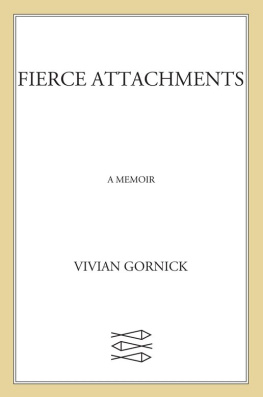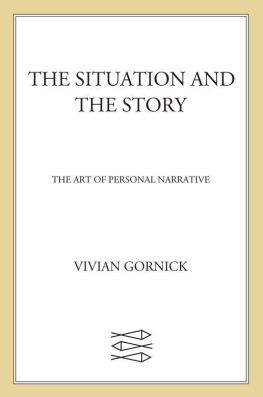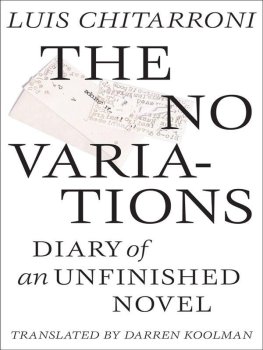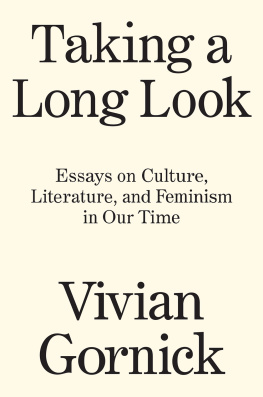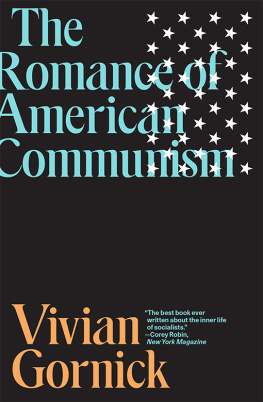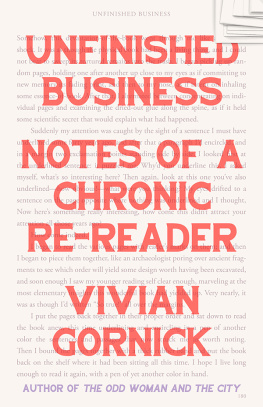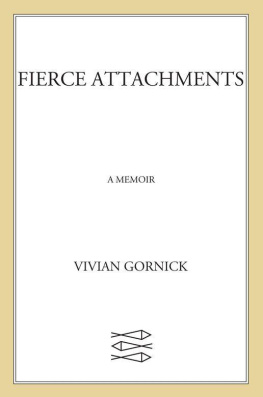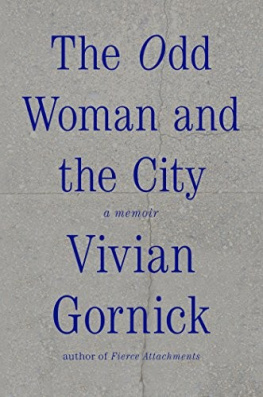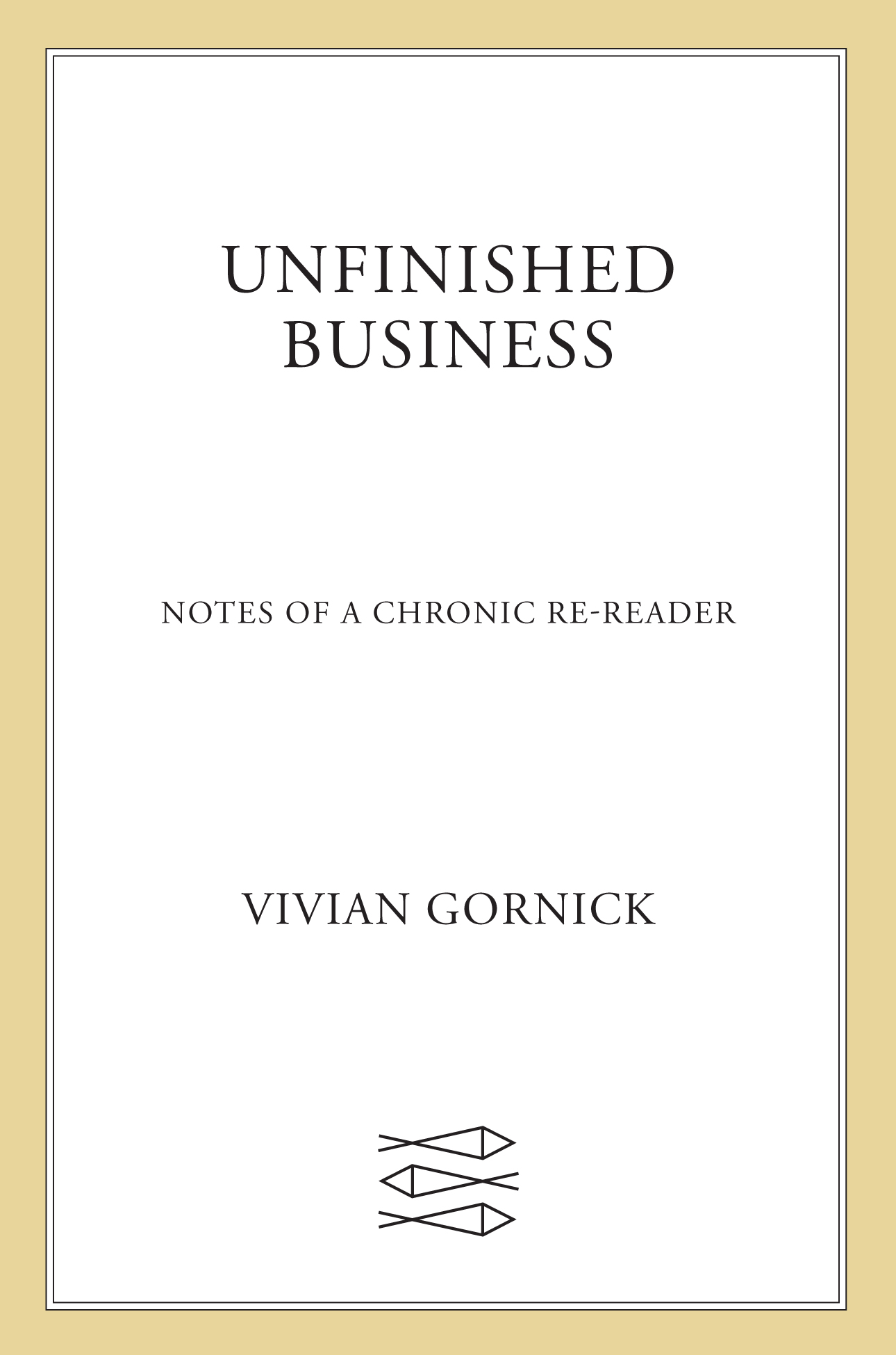There are sentences, paragraphseven whole passages in this bookthat appeared originally in other publications of mine. I have felt free to plagiarize myself, as it were, precisely because my subject here is re-reading, and I have found it useful to re-read myself by changing the context within which the thoughts inscribed in these passages first appeared. I sincerely hope the reader will not find this practice off-putting.
It has often been my experience that re-reading a book that was important to me at earlier times in my life is something like lying on the analysts couch. The narrative I have had by heart for years is suddenly being called into alarming question. It seems that Ive misremembered quite a lot about this or that character or this or that plot turnthey met here in New York, I was so sure it was Rome; the time was 1870, I thought it was 1900; and the mother did what to the protagonist? Yet the world still drops away while Im reading and I cant help marveling, If I got this wrong, and this and this wrong, how come the book still has me in its grip?
Like most readers, I sometimes think I was born reading. I cant remember the time when I didnt have a book in my hands, my head lost to the world around me. On vacation with family or friends, I am quite capable of settling myself, book in hand, on the living-room couch in a beautiful country house and hardly stirring out into the glorious green for which we have all come. Once, on a train going through the Peruvian Andes, with everyone else ooh-ing and aah-ing out the window, I couldnt lift my eyes from The Woman in White. On a Caribbean beach I sat in the blazing sun, Diane Johnsons Lesser Lives (an imagined biography of George Merediths first wife) propped on my knees, and was surprised when I looked up to see that I wasnt surrounded by the fog and cold of 1840s England. The companionateness of those books! Of all books. Nothing can match it. Its the longing for coherence inscribed in the workthat extraordinary attempt at shaping the inchoate through wordsit brings peace and excitement, comfort and consolation. But above all, its the sheer relief from the chaos in the head that reading delivers. Sometimes I think it alone provides me with courage for life, and has from earliest childhood.
We lived in an immigrant working-class neighborhood in the Bronx where all needs were met through the patronage of one of the many stores that ran the length of a single shopping street. The butcher, the baker, the grocer, the bank, the drugstore, the shoe repair: all storefront operations. One day, when I was quite small, seven or eight, my mother, holding my hand, walked us into a store Id never before noticed: it was the local branch of the New York Public Library. The room was long, the floorboards bare, and the walls lined, floor to ceiling, with books. In the middle of the room was planted a desk at which sat Eleanor Roosevelt (in those days, all librarians looked like Eleanor Roosevelt): a tall, bosomy woman with a mass of grey hair piled belle epoquestyle on the top of her head, rimless glasses perched high on her incredibly straight nose, and a look of calm interest in her eyes. My mother approached the desk, pointed at my head, and said to Eleanor Roosevelt, She likes to read. The librarian stood up, said Come, and walked me back to the front of the store where the childrens books were sectioned. Start here, she said, and I did. Between then and the time I graduated from high school, I read my way around the room. If Im asked now to remember what I read in that storefront library, I can only recall that I went from Grimms fairy tales to Little Women to Of Time and the River. Then I entered college where I discovered that all these years Id been reading literature. It was at that moment, I think, that I began re-reading, because from then on it was to the books that had become my intimates that I would turn and turn again, not only for the transporting pleasure of the story itself but also to understand what I was living through, and what I was to make of it.
ID GROWN UP in a noisy left-wing household where Karl Marx and the international working class were articles of faith: feeling strongly about social injustice was a given. So from the start, the politicalness of life colored almost all tangible experience, which of course included reading. I read ever and only to feel the power of Life with a capital L as it manifested itself (thrillingly) through the protagonists engagement with those external forces beyond his or her control. In this way I felt, acutely but equally, the work of Dickens, Dreiser, and Hardy, as well as Mike Gold, John Dos Passos, and Agnes Smedley. I had to laugh when, a few years ago, I came across an essay by Delmore Schwartz in which he (Schwartz) takes Edmund Wilson to task for Wilsons shocking lack of interest in literary form. For Schwartz, form was integral to the meaning of a literary work; for Wilson, what mattered was not how books were written but what they were talking about, and how they affected the culture at large. His habit, always, was to place a book in its social and political context. This perspective allowed him to pursue a line of thought that let him speak of Proust and Dorothy Parker in the same sentence, or compare Max Eastman favorably with Andr Gide. For Schwartz, this was pure pain. For me, it was inexpressibly rewarding. And what could have been more natural than that the way I read was the way I would begin to write.
ONE NIGHT toward the end of the 1960s, I attended a speak-out at the Vanguard, a famous jazz club in Greenwich Village. The evening was billed as Art and Politics, and on the stage was the playwright LeRoi Jones (later Amiri Baraka), the saxophonist Archie Shepp, and the painter Larry Rivers. In the audience, every white middle-class liberal in the city. Very quickly, it became clear that Art didnt stand a chance up against Politics. Jones dominated the event by announcing early that not only was the civil rights movement tired of what he called white intervention, very soon blood was going to run in the seats of the Theatre of Revolution and guess who was sitting in those seats. The place went up in flames, everyone yelling and screaming some version of Not fair! all at oncewith one voice in particular heard above the rest, crying out, Ive paid my dues, LeRoi. You know Ive paid my dues! But Jones, unperturbed and unimpressed by the uproar, continued to explain that we ofays had fucked it all up, but when they, the blacks, got there, they would do it differently: smash up the world as we knew it and start all over again. I remember thinking, He doesnt want to destroy the world as it is, he wants to take his rightful place in it as it is, only right now his head is so full of blood he doesnt know it.
I wanted badly to call that out, as everyone else was calling out whatever hurt most, but he terrified me (one can hardly imagine the strength of Barakas public presence in those painfully inspired days), so I kept silent, went home, and, burning with a sense of urgency I couldnt really account for, sat up half the night describing the entire event from the perspective of my one great insight; and discovering, as I wrote, what was to become my natural style. Using myself as a participating narrator, it was my instinct to set the story up as if writing a fiction (The other night at the Vanguard) in order to put my readers behind my eyes, have them experience the evening as I had experienced it, feel it viscerally as I had felt it (Ive paid my dues, LeRoi. You


